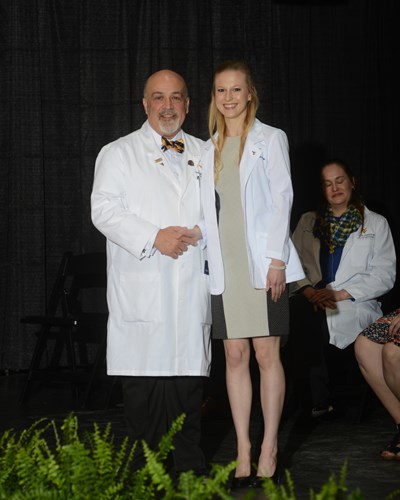Kathryn Baker

“I hope to get students excited and knowledgeable about preventing and reversing diseases through diet, physical activity, and abstinence from tobacco and illegal drug use.”
Growing up, Kathryn Baker heard plenty of stories about her grandfather, a physician who practiced in the Democratic Republic of Congo for 30 years and was extremely active in his community.
 Though she always knew that she wanted to work in public service, Baker—a second year medical student at West Virginia University—didn’t consider studying to become a physician until she took an introductory nutrition course as an undergraduate biology major. Students in the course were required to watch “Forks Over Knives,” a documentary that examines how switching from animal-based to plant-based diets can help eliminate or control diseases like cancer and diabetes.
Though she always knew that she wanted to work in public service, Baker—a second year medical student at West Virginia University—didn’t consider studying to become a physician until she took an introductory nutrition course as an undergraduate biology major. Students in the course were required to watch “Forks Over Knives,” a documentary that examines how switching from animal-based to plant-based diets can help eliminate or control diseases like cancer and diabetes.
The film opens with a quote from Greek physician Hippocrates, “Let food be thy medicine and thy medicine be thy food.”
That stuck with Baker.
“I could not get the concept out of my head,” she said. “I had never considered the capacity of food to restore health, heal diseases and provide harmony to our body. I enjoyed the documentary so much that I immediately watched it again and began ordering books on the topic.”
When Baker realized her passion for nutrition and combined it with her fascination with the human body and her desire to serve in her community, her decision to become a doctor was solidified.
Now two years into medical school, Baker is preparing for the School of Medicine’s white coat ceremony—an annual event marking the transition between basic sciences and clinical care. She says she sees the ceremony as a doorway between the stages in her education.
“As I spend my days studying and often feeling overwhelmed … it is hard to imagine what the next two years will be like when we finally get to see patients and apply this knowledge to clinical settings,” Baker said. “The white coat ceremony, to me, feels as though I finally have the key to open that door and get to peak clinical years.”
With plans to specialize in internal medicine and treating patients holistically, Baker will be heading to the WVU Eastern Campus to complete her third and fourth years of medical school. There, she will work closely with Rosemarie Cannarella, M.D., associate dean for student services and program director of the School’s new culinary and lifestyle medicine degree track, who Baker met through her involvement with the student-led Culinary Medicine Interest Group.
After graduation, Baker says she hopes to practice in West Virginia, and wants to address the state’s rising rates of chronic diseases. Currently, she is working with a classmate to launch a K-12 outreach program that will provide children with hands-on lessons about the human body and healthy lifestyle behaviors.
“I hope to incorporate this into my medical career, eventually expanding it across West Virginia, to get students excited and knowledgeable about preventing and reversing diseases through diet, physical activity, and abstinence from tobacco and illegal drug use,” Baker said.